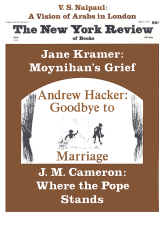In response to:
The New Two China Problem from the March 8, 1979 issue
To the Editors:
Before John K. Fairbank undertook to review Amnesty International’s Political Imprisonment in the People’s Republic of China (NYR, March 8), he should have taken a moment to familiarize himself with the purposes of the book and the organization which published it.
He could hardly have been wider of the mark in writing: “Presumably this survey is issued now because more evidence is available and also because Teng’s [Vice Premier Deng Xiaoping’s] modernization program lists the development of constitutional rights as one of its aims.”
If Professor Fairbank actually read the Amnesty report, he knows that it was largely completed before the recent outpouring of “evidence,” and was not particularly influenced by it. Furthermore, the above-quoted comment regarding Deng Xiaoping’s policies is both misleading and irrelevant to Amnesty International’s activities. AI is concerned with objective reality, and not influenced by any leader’s statement of intentions.
But Deng’s policies are not quite what Professor Fairbank implies. The vice premier is quite explicit about what modernization means to him. It concerns industry, agriculture, military affairs, and science and technology. Human rights figure here only to the extent that greater freedom for intellectuals will enable them to further goals in these areas.
I have examined the cases of many hundreds of men and women whose verdicts have been reversed during the last year. In virtually every instance, the verdicts have been reversed not because the people’s human rights had been violated, but because the political line which they had pursued is now deemed to be “correct.” Typically, in each batch of cases, a few of the verdicts are still seen as proper and the individuals continue to be punished.
Amnesty International’s important report warrants more than a perfunctory paragraph.
James D. Seymour
(Member, Advisory Committee, Amnesty International/USA)
Department of East Asian Languages and Cultures
Columbia University, New York City
John K Fairbank replies:
My review of nine books at once gave more space to AI’s report than to most of the others, even though it lacks the realistic insight of Pasqualini’s Prisoner of Mao. AI’s single-interest campaign against political persecution is very important. But such persecution has been widespread in all parts of China since 1949 (as well as before), since it is an integral part of the revolution and counter-revolution. Where has AI been all this time? My intended suggestion was that now is a good time to raise the issue, better late than never.
This Issue
May 3, 1979



